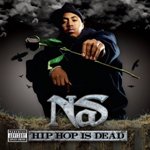
Nas
Hip-Hop is Dead
Island Def Jam
Rating: 




Nas is right, ya know. In a society where the individual is little more than a consumer, where truth is subjugated to marketing and hype is accepted as truth, our lives are worth less every day. Art means nothing and entertainment is paramount. But this isn’t a new phenomenon. Nearly everyone accepts this as fact, and almost as many are resigned to do nothing about it. There’s no evidence that this doesn’t apply to Nas. On Hip-Hop is Dead, he uses cultural deterioration as a metaphor for personal loss. If you’re expecting that the album amounts to anything more or less than this, you’ll be disappointed.
The Queensbridge emcee has always been better at telegraphing the details than framing the larger picture. Sure, he can string together a few keen observations that pass as wisdom, but he’s too contradictory and too megalomaniacal to be a leader. The only album where he presented a semi-unified socio-cultural critique was 2004’s underrated Street’s Disciple. On that disk he espoused old-school black separatism: African Americans should shield themselves from white culture, weed out the “acceptable Negroes” and boycott the white man’s politics. As the country was preparing to decide whether or not to give Dubya another four years as the leader of the world, the message didn’t exactly resonate. In a climate where hip-hoppers were encouraged to get involved in mainstream politics, the time wasn’t right for Nas’ message.
If you must find meaning, think of Hip-Hop is Dead as more of a personal eulogy than a public polemic. Nas has lost his youth, which he conveniently conflates with a social movement. To that extent, the most revealing track is “Not Going Back.” It begins with a scene of Nas driving away from a shootout with Kelis in tow. Wifey is hot, claiming that the gun exchange was unnecessary and dangerous. Nas knows this, but he’s still charged, and it’s clear that he resents a life where he is coddled and isolated, where existence is sterile and mundane. He yearns for a return to hood life, but knows that’s impossible. Like most of his listeners, he experiences that life vicariously. He might “buy the projects,” but he’s “not going back.”
The flip side of this dynamic is the excellent “Hold Down the Block.” The despair is in the details. Here, “brothers disappear,” “feds feast on street dons” and “rain hurt niggas bones who been shot.” It’s different from Nas’ other ghetto surveys because the focus is on over-the-hill dons who hold “38s in their forties.” He respects their grind, and enshrines their struggle, but he’s also glad that he’s not in their shoes and wants you to respect that. As he says on “Let There Be Light,” “I can’t sound smart/cuz y’all run away/They say I ain’t hungry no more/And I don’t talk about yay/Like there’s no other way for an ex-hustler/Â…I beg to differ.”
It’s not surprising that the album’s most viscerally immediate track, “Money over Bullshit,” is largely a technical exercise. Nas reels off images of “scarred grills, skully hats, and gaspy fullies.” He rhymes “pure euphoria” with “death to all y’all,” and calls out “snitches in rap” that get their “tails snapped and trapped.” By the third and final verse, where the QB emcee unleashes his flow, the listener is hypnotized. It doesn’t really matter that the lyrics amount to little more than a litany of money porn, subliminal disses and murder fantasies. It’s “deep by sound alone,” and it doesn’t matter if the themes aren’t original or insightful.
For those in need of the usual rap crit rhetoric, here goes: This is the best New York hip-hop album of the year. Nas’ collaboration with Jay-Z, “Black Republicans,” clinches that. Hip-Hop is Dead also ranks among the best of Nas’ career. It’s certainly no Nastradamus, his only true misstep, and rarely has the emcee been as consistently on point as he is here. Even when he latches onto a bad idea, as on the detective noir allegory, “Who Killed It,” the lyrics are too riveting for one to completely dismiss it. But despite the album’s greatness, fans will be let down. They expect Nas to resurrect Illmatic, something that was always more of an idea than an actuality. Like youth, that era is gone forever.
— Sam Chennault

